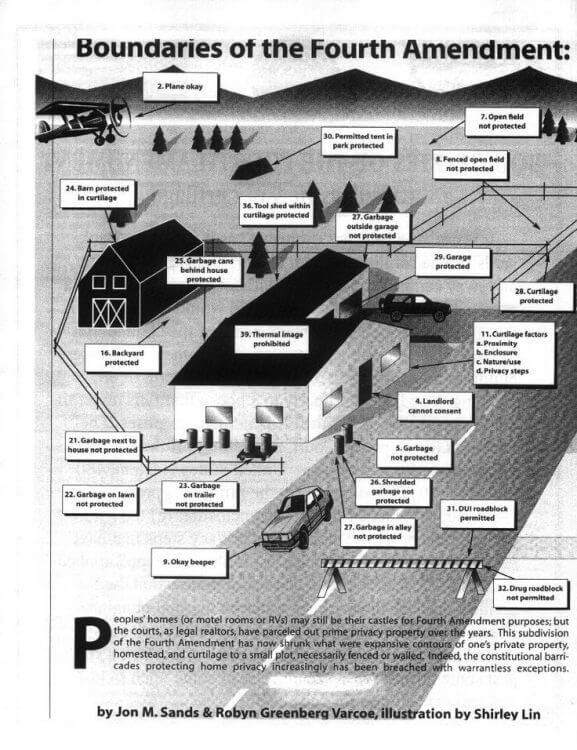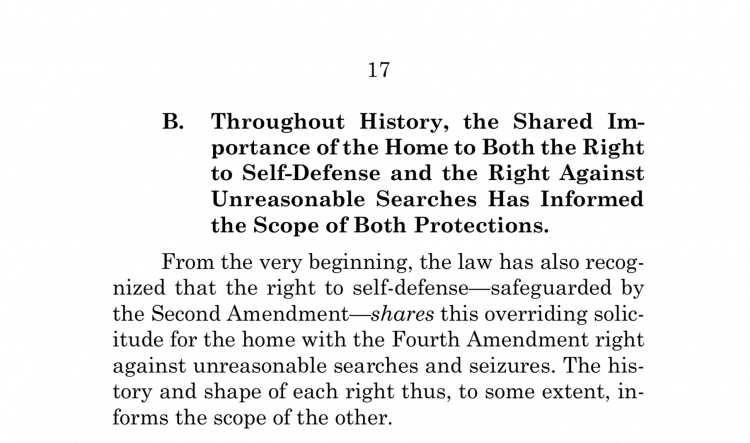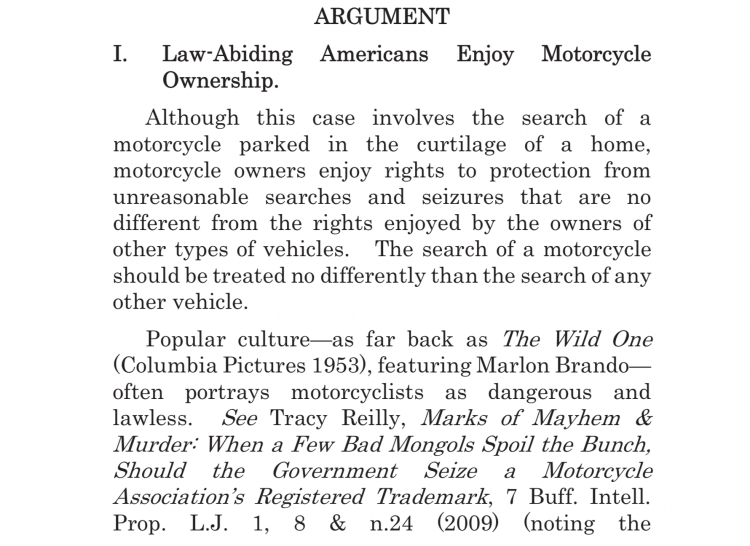“Curtilage” – that’s a funny word, eh? To lawyers dealing with fundamental constitutional rights, though, it’s a pretty important word. It’s a word that has recently made for some “strange bedfellows”… as shown in recent US Supreme Court filings.
In Collins v. Virginia the question of whether the search of a motorcycle without a warrant was lawful is the question. Collins was convicted of crimes relating to a stolen motorcycle. He challenged the search. “Amicus curiae” [“friend of the court”] Briefs SUPPORTING the criminal defendant’s claim that the search was illegal were filed by both the NRA and the American Motorcycle Association [AMA]!
The “curtilage” of one’s property is the area immediately surrounding a dwelling house which has been given the same protection under the law as was afforded the house itself. The US Supreme Court has held that the Fourth Amendment protects the curtilage of a house and that the extent of the curtilage is determined by factors that bear upon whether an individual reasonably may expect that the area in question should be treated as the home itself. In essence, Police cannot typically search the “curtilage” of one’s home without a warrant.
Here’s one artist’s interesting view of the 4th Amendment issues surrounding property, curtilage, outbuildings, garbage and the like…
In this case the motorcycle was parked in a “partially enclosed structure a few feet from the house” according to the NRA’s brief. The NRA frames the issue as a security issue – the Constitution protects the sanctity of one’s home and the right of self defense applies within the home…and the curtilage… The NRA argues here that the criminal defendant had the right to be free from warrantless searches in the partially enclosed structure b/c this was part of the curtilage. Rather, the NRA argues that the defendant could have shot anyone who tried to move or take anything from the structure – wellll…. OK… the NRA doesn’t argue that point directly… that the right of self-protection extends to the curtilage, and to this partially enclosed structure.
The AMA takes a different approach. The AMA argues:
“Although this case involves the search of a motorcycle parked in the curtilage of a home, motorcycle owners enjoy rights to protection from unreasonable searches and seizures that are no different from the rights enjoyed by the owners of other types of vehicles. The search of a motorcycle should be treated no differently than the search of any other vehicle.”
The AMA cites Marlon Brando and “The Wild One” and quotes from Zen & The Art of Motorcycle Maintenance” in making the argument that there is nothing inherently suspicious about a motorcycle. They discuss “motorcycle profiling” and the fact that the motorcycle here was under a “motorcycle cover” – which the court described as a “tarp.” They argue that there is nothing criminally suspicious about storing a bike under a cover designed for that purpose.
The AMA argues:
“Removal of a motorcycle’s cover without the owner’s permission would be, at the least, highly suspicious. It would almost certainly be understood as a prelude to theft (either of the motorcycle itself or personal possessions stored on the motorcycle) or vandalism.
The cover on a motorcycle can thus be understood as the rough equivalent of the top of a convertible. Even when the cover (or car) is unlocked, its removal still intrudes upon the reasonable expectations of privacy of the vehicle’s owner.
Motorcycles should receive no less protection from unreasonable searches than other vehicles. When the police removed the cover from Petitioners’ motorcycle, a search occurred. And as Petitioner contends, because that search occurred without a warrant and in the curtilage of a home, the search violated the Fourth Amendment.”
The same AMA argument for motorcycle owners would apply to bicycle owners, eh? We should be free from warrantless searches of our property, including our bicycles. We have a reasonable expectation of privacy in the bags and panniers we strap to our vehicles. We enjoy the same right to use the roadways – to move about the country – on our vehicles as car owners, motorcycle owners, pickup truck owners and other vehicle owners. We should also enjoy the same right to be free from unreasonable searches and seizures. Somehow, though, I just can’t see the NRA jumping to our defense…
The AMA & NRA filing briefs in the US Supreme Court supporting the rights of a criminal defendant… who’d a thunk it?
What did Mr. Collins actually DO you ask? He was convicted of receiving stolen property.
Here’s the facts:
“On two occasions, a particular unique-looking motorcycle evaded Albemarle police officers after they observed the rider violating traffic laws. After some investigation, one of the officers located the house where the suspected driver of the motorcycle lived and observed what appeared to be the same motorcycle covered by a tarp in the driveway. The officer lifted the tarp and confirmed that it was the motorcycle (which was also stolen) that had eluded detainment on multiple occasions. The officer waited for the suspect to return home, at which point he went to the front door to inquire about the motorcycle. Initially the suspect denied knowing anything about it but eventually confessed that he had bought the motorcycle knowing that it had been stolen. The officer arrested the suspect for receipt of stolen property.”
© 2025.



It makes me wonder why they couldn’t bother to get a warrant. They just need to leave one officer parked there to make sure he doesn’t ride off, which would of course require him to uncover the stolen bike himself.
All this over laziness?
Interesting. In New Mexico, a horse, bicycle, motorcycle, or car are considered extensions of the home as far as concealed carry and the Castle Doctrine.
OTOH, one of my best friends from college finally recovered a motorcycle stolen from him about ten years ago. I was glad to hear that.